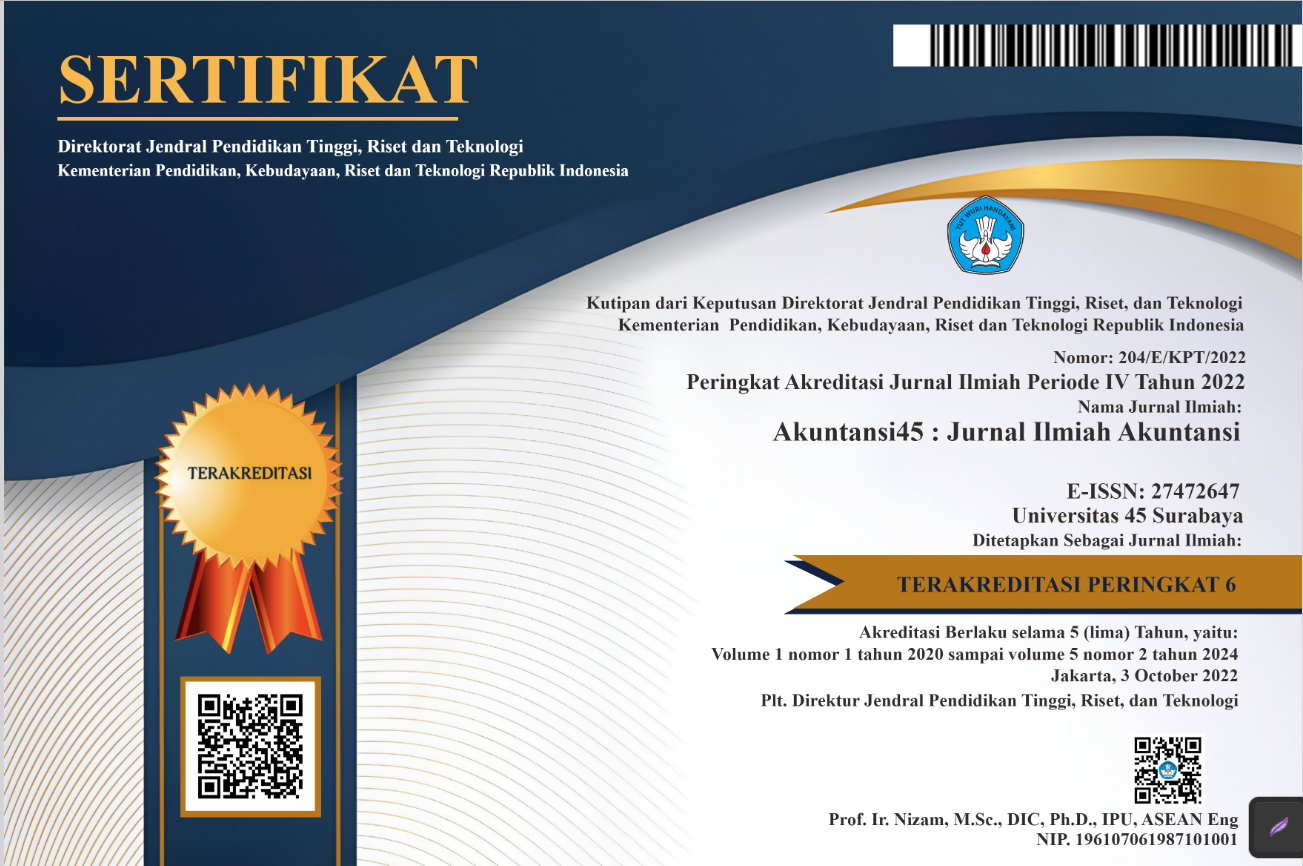Analisis Organizational Citizenship Behavior Dalam Upaya Peningkatan Mutu Dosen Perguruan Tinggi Keagamaan Islam Negeri Di Indonesia
DOI:
https://doi.org/10.30640/akuntansi45.v3i1.1385Keywords:
Organizational Citizenship Behavior, Quality ImprovementAbstract
The position of work involvement as a mediator influencing the management of personality and grit talents towards OCB is an aspect of theoretical novelty studies. The purpose of this study is the effect of work involvement as a mediating variable between talent management, personality and grit and organizational citizenship behavior. This study uses a quantitative approach with a causal design. The research was conducted through a survey. This research was conducted at 3 PTKIN namely UIN Padang, IAIN Bukittinggi and STAIN Mandailing Natal. The results of this study are First, there is a direct influence between talent, personality and grit management on OCB as shown by the estimated coefficient of each 0.155 (significant at p<0.05 ), 0.310 (significant at p<0.01), 0.268 (significant at p<0.01) and 0.201 (significant at p<0.01). Second, job withdrawal does not mediate the relationship between personality and OCB (VAF=0.190, p<0.01). Third, giving up work did not mediate the relationship between grit and OCB (VAF=0.190, p<0.01). Thus the results of this test reveal that work involvement only mediates the influence of the talent management relationship on OCB, but does not mediate the influence of personality and persistence on OCB.
References
Gtz.MatchingVocationalEducationinGeorgiawithLabourMarketNeeds. Private Sector Development Program Georgia, (July), 1–89, (2010)
Bejaković, P., & Mrnjavac, Ž. Skill Mismatches and Anticipation of the Future Labour Market Need: Case of Croatia. Zagreb International ReviewofEconomics & Business, 17(1), 47–68, (2014)
Schnake, M., D. Cohran & M. Dumler, Encouraging organizational citizenship: the effect of job satisfaction, perceived equity and leadership, Journal of Managerial Issues, Vol. 7(1995)
Jahangir, N., Akbar, M. M., & Haq, M. (2004). Organizational citizenship behavior: Its nature and antecedent. BRAC University Journal, 1(2), 75-85.
Jex, S. M. (2002). Organizational psychology a scientist-practitioner aproach. New York: John Wiley & Sons.
Organ, D. W., Organizational Citizenship Behavior, The good soldier syndrome. Lexington, MA, Lexington Books,(1988).
Organ, D. W., and Ryan, K. (1995). A meta-analytic review of attitudinal and dispositional predictorsof organizational citizenship behavior. Personnel Psychology, 48(4), 775-803.
Cappelli, P., Talent on Demand: Managing Talent in an Age of Uncertainty. Boston, MA: Harvard Business School Press, (2008).
Chodorek, M., & Sudolska, A. The Significance of Organisational Citizenship Behaviours for Talent Management--the Example of Polish Companies. Economic and Social Development (Book of Proceedings), 10th International Scientific Conference on Economic And, 3(September), 257, (2015)
Ajgaonkar, M., Utpal, B., & S.M., P. Relationship Between Organizational Citizenship Behavior and Job Characteristics Model of Motivation : An Empirical Study. NMIMS Management Review, (May 2012), 51–72,(2012).
Peyrat-Guillard, D., & Glinska-Neweś, A. I Respect You and I Help You : Links Between Positive Relationships At Work and Organizational Citizenship Behaviour, 5(2), 82–96. https://doi.org/10.12775/JPM.2014.015, (2014).
Neuman, G. A., & Kickul, J. R., Organizational Citizenship Behaviors: Achievement Orientation And Personality. Journal of Business and Psychology. 13. 263-279, (1998).
Singh, A. K., & Singh, A. P. Does Personality Predict Organisational Citizenship Behaviour among Managerial Personnel. Journal of the Indian Academy of Applied Psychology, 35(2), 291–298,(2009).
Duckworth, A. L., Peterson, C., Matthews, M. D., & Kelly, D. R. Grit: Perseverance and Passion for Long-Term Goals. Journal of Personality and Social Psychology, 92(6), 1087–1101, (2007). https://doi.org/10.1037/0022-3514.92.6.1087
Duckworth, A. L., and Kern, M. L. A Meta-Analysis Of The Convergent Validity Of Self-Control Measures. Journal of Research in Personality, 45(3), 259-268,(2011).
Duckworth, A. L., & Quinn, P. D. Development and Validation of the Short Grit Scale ( Grit – S ) Development and Validation of the Short Grit Scale ( Grit – S ), (October 2012), 37–41. http://doi.org/10.1080/00223890802634290 ,(2009).
Duckworth, A. L., and Eskreis-Winkler, L. True Grit. The Observer. 26(4), 1- 3,(2013).
Duckworth, A. L., Peterson, C., Matthews, M. D., & Kelly, D. R. Grit: Perseverance and Passion for Long-Term Goals. Journal of Personality and Social Psychology, 92(6), 1087–1101, (2007), https://doi.org/10.1037/0022-3514.92.6.1087
Ferrell, B., & Systems, H. A. Identifying Grit in Existing Personality and Other Individual Differences Taxonomies, (2017).
Robbins, S. T., Judge, T. a, & Hasham, E. S. OrganizationalBehavior. Pearson Education Limited, (2009).
Gheisari, F. Explaining the Relationship between Organizational Climate, Organizational Commitment, Job Involvement and Organizational Citizenship Behavior among Employees of Khuzestan Gas Company. Mediterranean Journal of Social Sciences, 4(4), 282–290, (2014). https://doi.org/10.5901/mjss.2014.v5n20p2986
Nwibere, B. M. (2014). International Journal of Management and Sustainability Interactive Relationship Between Job Involvement , Job Satisfaction , Organisational Citizenship Behaviour , And Organizational Commitment In Nigerian Universities. International Journal of Management and Sustainability, 3(6), 321–340. https://doi.org/10.18488/journal.11/2014.3.6/11.6.321.340
Ueda, Y. Organizational Citizenship Behavior In A Japanese Organization : The Effects Of Job Involvement , organizational commitment , and collectivism,1–14.
Saxena, S., & Saxena, R. Impact of Job Involvement and Organizational Commitment on Organizational Citizenship Behavior. International Journal of Management And, 5(1), 19–30, (2015). Retrieved from http://ijmbr.srbiau.ac.ir/?_action=articleInfo&article=5688
Beheshtifar, M., Nasab, H. Y., & Moghadam, M. N. Effective talent management: A vital strategy to organizational success. International Journal of Academic Research in Business and Social Sciences, 2(12), 227–234, (2012), Retrieved from https://vpn.utm.my/docview/1437191136?accountid=41678
Liao, C., & Lee, C. An Empirical Study of Employee Job Involvement and Personality Traits : The Case of Taiwan. International Journal of Economics and Management, 3(1), 22–36, (2009). https://doi.org/10.1016/j.sbspro.2012.05.346
Eswaran, S., Islam, M. A., & Yusuf, D. H. M. A Study of the Relationship between the Big Five Personality Dimensions and Job Involvement in a Foreign Based Financial Institution in Penang. International Business Research, 4(4), 164–175, (2011), https://doi.org/10.5539/ibr.v4n4p164
Fornell C, Larcker DF. Evaluating structural equation models with unobservable variables and measurement error. J. Mark. Res., 18(1): 39-50, (1981).
Ferrell, B., & Systems, H. A. Identifying Grit in Existing Personality and Other Individual Differences Taxonomies, (2017).
Jahangir, N., Akbar, M. M., & Haq, M. (2004). Organizational citizenship behavior: Its nature and antecedent. BRAC University Journal, 1(2), 75-85.
LePine, J. A., Erez, A., & D. E. Johnson. The Nature and Dimensionality of Organizational Citizenship Behavior: A Critical Review and Meta-Analysis. Journal of Applied Psychology. 87(1). 52-65, (2002).
Smilansky, J. Developing Executive Talent. New Jersey: John Wiley & Sons Ltd,(2006).
Collings, D.G. & Mellahi, K. Strategic Talent Management: A review and research agenda. Human Resource Management Review, 19 (4), pp. 304-313, (2009).
Passer,MichaelW.,andRonaldE.Smith.Psychology:The Science of Mind and Behavior. New York: McGraw-Hill, (2007)
Greenberg, Jerald & Robert A. Baron. Behavior in Organization New Jersey: Prentice Hall,(2008)
Daft,RichardL.danDorothyMacrcic.Management:TheNewWorkplace.
United Kingdom: South-Western, (2008).
Berger, L., and D. R. Berger. Talent Management Handbook. New York: Mc-Graw-Hill,(2004)
Culin, K. R. Von, Tsukayama, E., & Duckworth, A. L. Unpacking Grit : Motivational Correlates Of Perseverance And Passion For Long-Term Goals. The Journal Of Positive Psychology, (2008), 1–7, (2014) Http://Doi.Org/10.1080/17439760.2014.898320
Ryne A. Sherman & Brandon Ferrell. 2016. Locating Grit within the Hogan Assessment Instruments. The Report of the 2017 SIOPconference
Rimfeld, K., Kovas, Y., Dale, P. S., Plomin, R., Centre, D. P., Genetics, B., & Sciences, H. (2016). Personality, 111(5), 780–789,(2016)
Hair, J., Hult, GTM. Ringle, B.M., & Sarstedt, M., A Primer on Partial Least Squares Structural Equation Model, Sage, Thousand Oaks,(2013).
Podsakoff, P., MacKenzie, S., Paine, J., and Bachrach, D. (2000). Organizational citizenship behaviors: A critical review of the theoretical and empirical literature and suggestions for future research. Journal of Management, 26(3), 513-563.
Santrock, John S. Educational Psychology. (2008). New York:McGraw-Hill
Stahl, G., Björkman, I., Farndale, E., Morris, Shad S., Paauwe, Jaap and Stiles, Philip and Trevor, Jonathan and Wright, Patrick. Six Principles Of Effective Global Talent Management. Sloan Management Review, 53 (2). pp. 25-42, (2012). ISSN 1532-9194. Available at: http://epub.wu.ac.at/3616/
Tenenhaus, M, Esposito Vinzi, V., Chatelin, T.M., and Lauro, C., “PLS Path Modelling”, Computational Statistics and Data Analysis, 48(1), 159-205, (2005).
Zhou, K., Non-Cognitive Skills : Definitions, Measurement And Malleability. Background Paper Prepared For The 2016 Global Education Monitoring Report . Education for people and planet: Creating sustainable futures for all. UNESCO,(2006).
Organ, D. W., Podsakof, P. M., and Mackenzie, S. B. (2006). Organizational citizenship behavior: Its nature, antecedents, and consequences. California: Sage Publication.
Bukhari, Z. U., Ali, U., Shahzad, K., and Bashir, S. (2009). Determinants of organizational citizenship behavior in Pakistan. International Review of Business Research Papers, 5(2), 132-150.
Pare', G., and Tremblay, M. (2000). The measurement and antecedent of turnover intention among IT professionals. Scientific Series. Diakses 23 Januari 2011 dari http://www.cirano.qc.ca/pdf/publication/2000s-33.pdf
George, J. M. and Bettenhausen, K. (1990). Understanding prosocial behavior, sales performance and turnover: A group-level analysis in service context. Journal of Applied Psychology, 75, 698-709.
Podsakoff, P. M., and Mackenzie, S. B. (1994). Organizational citizenship behavior and sales unit effectiveness. Journal of Marketing Research, 31(3), 351-363.
Podsakoff, P., MacKenzie, S., Paine, J., and Bachrach, D. (2000). Organizational citizenship behaviors: A critical review of the theoretical and empirical literature and suggestions for future research. Journal of Management, 26(3), 513-563.
Robbins, S.P. (2006). Perilaku Organisasi Edisi Lengkap. Jakarta: PT INDEKS Kelompok GRAMEDIA
Bienstock, C.C., DeMoranville, C.W., dan Smith, R.K. ( 2003). ”Organizational Citizenship Behavior and Service Quality”. Journal of Services Marketing, Vol 17 No. 4, 2003 pp. 357- 378
Robbins dan Judge (2008). Perilaku Organisasi, Buku 1, Cet. 12. Jakarta: Salemba Empat. http://books.google.co.id/books?id=IwrWupB1rC4C&pg=PA40&lpg=PA40&dq=perilaku+kewargaan+organisasional&source=bl&ots=i6ly5w997Y&sig=tVtvQ3E6Qyr32_PDigI2Donj2ko&hl=id&ei=QzFhS7ukDsqHkQWxr5HtCw&sa=X&oi=book_result&ct=result&resnum=2&ved=0CAkQ6AEwATgK#v=onepage&q=perilaku%20kewargaan%20organisasional&f=false . Diakses tanggal 01 November 2019
Turnipseed, D., dan Murkison, G. (1996). “Organization Citizenship Behaviour: an Examination of the Influence of the Workplace”. Leadership & Organization Development Journal . 17/2 [1996] 42–47 13-40
Bolino, M.C., Turnley, W.H., dan Bloodgood, J.M. ( 2002). “Citizenship Behavior and the Creation of Social Capital in Organization”. Academy of Management Journal, Vol. 7, No. 4, 2002 pp. 502 – 522.
Cohen,A & E. Vigoda. 2003. Do Good Citizen Make Good Organizational Citizens Administration and Society. Vol 32, 596-624.
Diefendorff, Brown, Kamin, & Lord. (2002). Examining the roles of job involvement and work centrality in predicting organizational citizenship behaviors and job performance. Journal of Organizational Behavior, Vol 23, pp. 93-108
Liao, C. S. and Lee, C. W. (2009). An Empirical Study of Employee Job Involvement and Personality Traits: The Case of Taiwan. Journal of Economics and Management, 3(1), pp. 22-36.
Organ, Dennis.W., Podsakoff, Philip.M., & MacKenzie, Scott B.2006. Organizational citizenship behaviour its nature, antecedents, and consequences. United states of America: Sage Publication, Inc.
Bachrach, D G. Et al. 2000. Organizational citizenship behavior : A critical review of the theoritical and empirical literature and suggestions for future research. Journal of Management, 26, 513-563.
McClelland, D. 1961. The Achieving Society. New Jersey: Van NostrandPurba, D. E & Seniati, A. N. C. (2004). Pengaruh kepribadian dan komitmen organisasi terhadap organizational citizenship behavior. Makara, Sosial Humaniora, 8 (3).
Kumar, K. J., Bakhshi. A & Rani. E. (2009). Linking the Big Five Personality Domains to Organizational Citizenship Behavior. International Journal of Psychological Studies. 1 (2), 73-81
Pervin, L.A, Cervone, D & John, O.P. (2005). Personality theory and research. John Wiley & Sons, Inc.
George, J.M., & Jones, B.R. (1992). Understanding & managing organizational behavior, 3rd ed. New Jersey : Pearson Education Inc.
Newstrom, J.W. & Davis, K. (2002). Organizational behavior, (11th ed).New York : McGraw-Hill
Sampath. K. (2008). The impact of five factor model of personality on organizational citizenship behavior of non-managerial employees in the banking sector in Sri Lanka. Disertasi. Malaysia: Management and Science University
SGoel, V. Technical and vocational education and training (TVET) system in India for sustainable development. Ministry of Human Resource Development Report, 1–21 (2009). Retrieved from http://www.unevoc.unesco.org/up/India_Country_Paper.pdf









